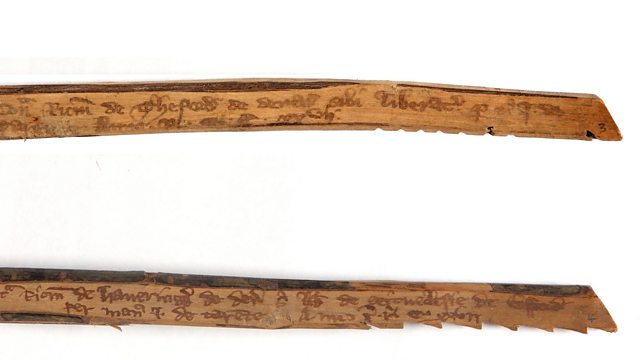Tally Stick
The tally stick was a kind of money, and a particularly instructive kind of money. It shows us what money really is: a kind of debt that can be traded freely.
Tally sticks were made from willow harvested along the banks of the Thames in London. The stick would contain a record of the debt. It might say, for example, “9£ 4s 4p from Fulk Basset for the farm of Wycombe”. Fulk Basset, by the way, might sound like a character from Star Wars but was in fact a Bishop of London in the 13th century. He owed his debt to King Henry III. Now comes the elegant part. The stick would be split in half, down its length from one end to the other. The debtor would retain half, called the “foil”. The creditor would retain the other half, called the “stock”. (Even today British bankers use the word “stocks” to refer to debts of the British government.) Because willow has a natural and distinctive grain, the two halves would match only each other. As Tim Harford explains, the tally stick system enabled something radical to occur. If you had a tally stock showing that Bishop Basset owed you five pounds, then unless you worried that Bishop Basset wasn’t good for the money, the tally stock itself was worth close to five pounds in its own right - like money; a kind of debt, which can be traded freely.
Editors: Richard Knight and Richard Vadon
Producer: Ben Crighton
(Photo: Medieval tally sticks, accounts of the bailiff of Ralph de Manton of the Ufford Church Northampton. Credit: National Archives)
Last on
Sources and related links
William N. GoetzmannĚýandĚýK. Geert Rouwenhorst Ěý- The Origins of Value,Ěý Oxford University Press 2005
Goetzmann and Williams - “From Tallies and Chirographs to Franklin’s Printing Press at Passy” – from the Origins of ValueĚý
Felix Martin - Money: The Unauthorised Biography London: Bodley Head (2013) Chapter OneĚý
David Graeber - ĚýDebt: The First 5000 years London: Melville House (2014) p47
Ěý
Broadcasts
- Sat 27 May 2017 02:50GMT±«Óătv World Service except Online, Australasia, News Internet & UK DAB/Freeview
- Sat 27 May 2017 19:50GMT±«Óătv World Service except East and Southern Africa, News Internet & West and Central Africa
- Mon 29 May 2017 03:50GMT±«Óătv World Service Online & UK DAB/Freeview only
Podcast
-
![]()
50 Things That Made the Modern Economy
The stories of inventions, ideas and innovations which helped create the economic world


